Since Residente entered our world with the Grammy award-winning duo Calle 13, we’ve known him as one of reggaetón and rap’s most outspoken artists—he won’t bite his tongue to call out political figures and he’ll do it in one of the most poetic ways we’ve heard; The rapper’s infectious reggaeton rhythms have more than given the revolution something to dance to. But until recently, there was a side of the rapper he hadn’t shown the world.
Residente’s most recent single, “Rene,” a part of his forthcoming album—his first since 2017’s Residente—shows us one of the darkest places he’s been mentally and emotionally to date.
“Ya no queda casi nadie aquí/ A veces ya no quiero estar aquí/ Me siento solo aquí/ En el medio de la fiesta” he raps in the song.“
The rapper said he started feeling down when he had some time to think in between finishing what was a very successful chapter with Calle 13 and beginning his work as a solo artist.

“In the first years you don’t think about it, but then when you keep going and keep going [you do,]” he tells Remezcla ahead of his epic performance with Gustavo Dudamel and the Los Angeles Philharmonic. ”I think that when I realized that I was feeling that way was when I stopped Calle 13 to start Residente.”
He said the song might shatter some of the ideas people may have of him: “Maybe some people have an idea of what I am or who I am and what I represent, and I know with the song, it could help humanize me in a way that they say, man, this guy, he’s like me.”
After the song’s release, Bad Bunny, Don Omar, Camila Cabello, among other artists and fans reached out to share their support. The rapper said he’s now feeling better and at the time of the interview was particularly excited about sharing the stage with one of the most respected conductors and orchestra directors in and out of Latin America Gustavo Dudamel for his Power To The People Performance, in which he performed “Rene” with a special arrangement.

Residente is also pumped about his next album and shared he won’t box himself into any genre. “You’re going to feel everything,” he says. “I’m not trying to force something that I don’t feel.”
Remezcla caught up with the rapper before his performance at the LA Philharmonic to talk new music, working with Gustavo Dudamel, his most personal song yet and reactions to it.
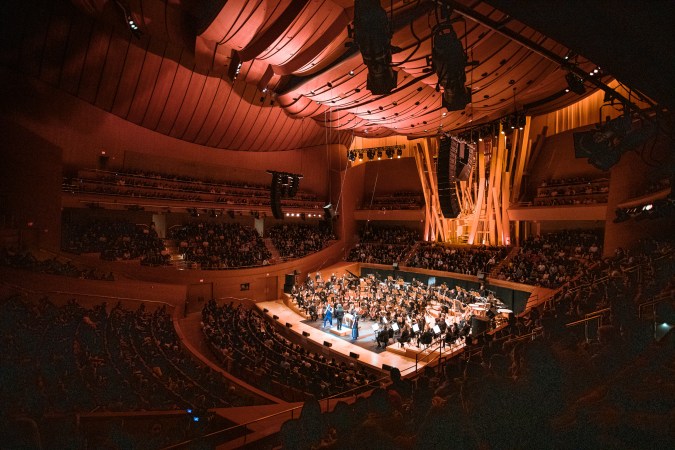
Your latest song, Rene, is very personal. You reveal that there have been times where you felt not so good about life. I’m wondering, did these feelings develop once you launched your career?
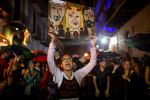
No, I think that once these feelings started, once you realize that you’re giving up part of what you used to be [is when they began.] I also think maybe it’s when you get older and feel that way too. Maybe that’s why a lot of people have connected to this song in an emotional way. It’s something that I started to develop, that feeling, when of course Calle 13 started and in the first years you don’t think about it, but then when you keep going and keep going [you do.] I think that’s when I realized that I was feeling that way, when I stopped Calle 13 to start Residente, and I had a moment to think about a lot of things and I went to different parts of the world to do my first album, my solo album Residente, which is my favorite album. Because of that, because I had the opportunity to think, I was in Siberia with people that I didn’t know well. I had one of my brothers with me, but other than that we were alone in the middle of nowhere, surrounded by mountains, and I had the opportunity to think a lot. I think that I started to develop different feelings.
What inspired you to talk about this now?
It’s something that just happened. There are songs that you can’t control. It’s something that happens, and you don’t think, “Oh, what I’m going to write about this now?” This particular song just happened one night. Next day I was writing. I was feeling very sad and the next day I started to write the song and I wasn’t thinking about doing a song about it. I just wanted to write. Sometimes I write, it doesn’t mean that it’s going to become a song.

I wrote it and then I thought that maybe it was good to write it in a way—I don’t know, to tell my story to my friends. I was thinking about my friends. I don’t know, I thought that maybe they could relate to me more and to understand, and I can understand them too with the feedback. Kind of like when you become an artist and you establish a relationship with your fans or people that follow you.
When I first wrote the song, I was trying to fix myself, to feel better. It was like my therapy, and I wrote it because of that.
The song has been listened to over millions of times. Bad Bunny has come out to support you. Are you happy that people are receiving this moment in your life in a very positive way?
For me, it’s something great. First of all, because this feeling is something that I had two and a half years ago. Right now I’m super happy, I’m ready to do everything. I was ready before, but I was feeling like that and I just put it out. For me it was nice that I felt the support of a lot of people, people who don’t know me. Well, most of the people don’t know me, but people who don’t follow me, they connected to the song, and also colleagues from the urban genre, all of them like they were not only supportive but connecting with the song because they feel the same way, some of them. I remember when I played the song for Benito, because he listened to the song before at the studio, I played it and he was like, “Man, this is the way I was feeling right now and I know it’s kind of like that too.” He’s a very sensitive guy.

Other people, like Shakira, or Camila Cabello or people that started to send me messages on the phone, different actors, like Zoe Saldaña, a lot of people like it. They started to send me messages. I was like, man, people really got connected with this. I never thought that it was going to happen like that. Also it’s a song that is almost eight minutes and it’s me with a piano. It’s an arrangement of strings, it’s a very minimalistic song. I was surprised that it went viral. It’s nice. It makes me believe in music. I believe in music, but it makes me feel that there is a need for real things like that, honest things. People want that too.
I’m not saying that people that don’t need the other stuff too them, to have fun. I like that. I like to have fun, it’s just that there’s also another thing, another part, and it’s this, to be real and honest with your feelings and put them out there. I’ve been doing that through my whole career, and it’s nice. These days music is more focused on things that are faster, two minute songs and easy and catchy and to dance and to shake your butt [to.] When you put a song out almost eight minutes [long] with a piano and a voice, super deep and it goes viral and goes in the top 50… I don’t care about that, as you can tell because I’ve never posted anything, “Oh we are at 50 million now.” I don’t post that, because it doesn’t matter to me, but it matters in the sense today to me that matters. Those numbers matter, and that idea of having a song like this inside this world of numbers is great.
This is very much your moment—dealing with mental health—but I think that your experience, sharing this part of yourself can really deconstruct masculinity. I think in Latino cultures and in other cultures, a lot of men don’t feel comfortable sharing or don’t have a space to talk about mental issues in general. I feel like in urban and just in other aspects of music, this could really help people be more open. Did you ever think that your song could do this?
No. When I first wrote the song, I was trying to fix myself, to feel better. It was like my therapy, and I wrote it because of that. I never thought that it was going to help anyone. Actually, I didn’t think about mental health, that it was connected to that, till people started to talk about it and I was like, “oh, this is part of the conversation.” Yeah, it’s true, because I was passing through a moment. I’m not saying that I was passing through the worst moment in my life or something, like one night everything exploded at the same time, and that can happen to anyone. I’ve never felt that depression in my life, never in my life, and I don’t know if it’s… actually, that was the depression. Naturally, I was feeling like that. I don’t know how to name what I was feeling, so I started to write and then I spoke with my mom, then I spoke with my family, little by little.
Then when I felt that I was ready to put the song out, I did it. It took me two years to put it out. It’s not that I wanted to put it out right away. I also wanted to feel good, and better understand my feelings because that’s what I usually do when I feel bad. I try to work it out with myself. I know that I can do it, and I don’t like the pills, and when you go to a psychiatrist, when they give you medication. I’m not saying that I’m against it, but I don’t like it. I know people, maybe they need that, but I don’t like it. I tried to talk to the psychologist that I have when I’m on tour, and I stopped talking to her, but I used to talk to her a lot. When I stopped talking to her, that’s when this thing happened. It’s not that I don’t super need her, but sometimes you can easily lose track of what’s happening, so it’s always good to talk to someone.
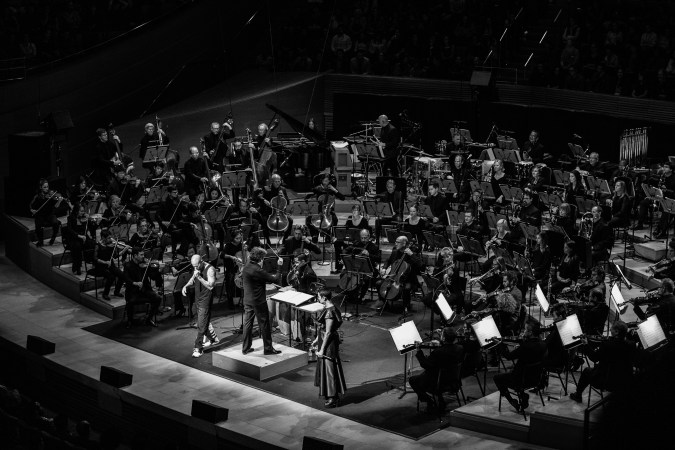
Your music has brought so much happiness to your fans, and you’re such a joyful presence on stage. With this new song, was it tough for you to be vulnerable in this way? Were you afraid that fans might see you differently?
I think I’ve been vulnerable before, in other songs, but not about myself. [In the song] about Latin America, I felt that song. [In] “Hijos Del Cañaveral” about Puerto Rico. I also think it’s a different kind of vulnerability, and they can say that I’m sensitive… I’m used to showing my feelings, everyone knows that. When I’m mad I say it, I’m impulsive. I have that, but this part, this side of me, they’ve never seen it before either. Maybe some people have an idea of what I am or who I am and what I represent, and I know with the song, it could help humanize me in a way that they say, man, this guy, he’s like me. That happens to me too, and to connect. Didn’t put it out there because of that. Actually I put it out there just thinking a lot more fans might like to have the story of my life in a song, and how I got there and how I’m feeling. Also, afterwards I thought about featuring my son [in the video] because sooner or later they’re going to see his face.
I went and I spoke with him first and he agreed, he wanted to be part of it. He’s five years old but he’s super intelligent and I spoke to him about the reason I wanted to do it and he liked it and then I spoke with his mom and she was okay… People ask, “Why don’t you show his face [on social media]?” It’s because I don’t want him to be part of something that he doesn’t understand yet. Social media can be very bad too. Sometimes it’s good and sometimes it’s horrible. It’s a different world. Since he understands now what I do for a living and he understands what a music video is and since I explained to him the meaning of the song, that’s why we did it.
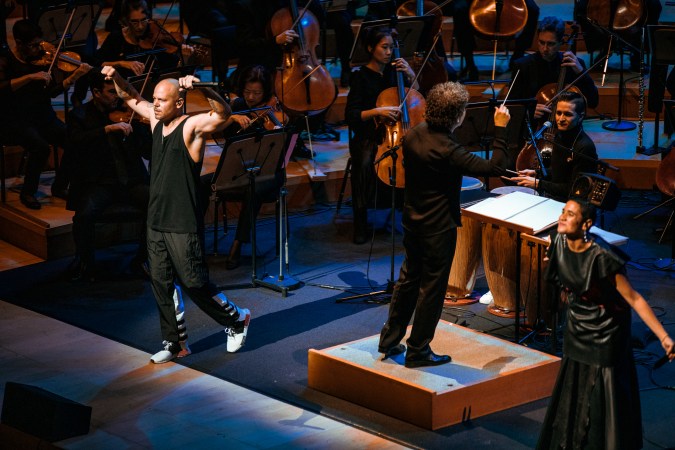
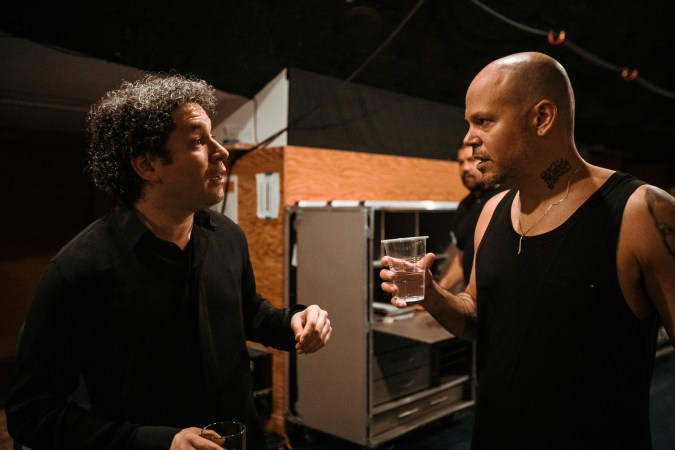
You’re in LA now. You’re going to be performing with the LA Philharmonic, Gustavo Dudamel. What are you most excited about for this performance?
Well, I’m excited about everything. For me it’s great. This is going to give me a bunch of ideas for the future too. This is the first time I wasn’t involved in the musical arrangements. It was Julio. I don’t have his last name, but they did it. I was listening to the arrangements and they’re great and now I’m like, man, I would like to do this but be also part of the musical arrangement and help out too. I’m super excited to see how it’s going to go, also because I’m a fan of Gustavo Dudamel and he’s a great guy. [I’m excited] to collaborate with him again, because we did it at the Grammy’s once in 2011 I think for “Latin America.”
You’re working on a new album. You’ve already taught us so much about politics and things going on in Latin America, and have made us dance in past albums. What can we expect in your next one?
You’re going to feel everything. For example, “Bellacoso” is a part of the album, also “El Pecador.” Those songs are very different from each other, and then you have “Rene.” You have a reggaeton with Bad Bunny and suddenly you have” El Pecador” that is trap, and it’s very the opposite of “Rene” and then you have other songs that I’m going to put out before the album comes out. I think it’s going to come out in May, so we’re going to have maybe two more singles and they’re going to be different from each other. Everything on the album is like that, it’s very different from each other, every song. I’m not trying to force something that I don’t feel. I have really nice people collaborating on the album, and everyone is very different. I have a lot of rap too because I really like hip-hop, but it’s mixed. It’s very mixed. It’s very balanced. For now I have 16 songs.
You were hanging out with Action Bronson not too long ago. Can we expect a collaboration with him?
Yeah, it can happen. That can happen, and also [other] people. I will let you know, but it’s like… I have other rappers that are super good that I really admire. I think I want to do a complete album and have it be versatile. It’s not an album that stays in [one] thing. It’s not going to be an album, it’s going to be music and also rap. It’s not going to be part of the trend. Maybe it’ll make a trend (laughs).




